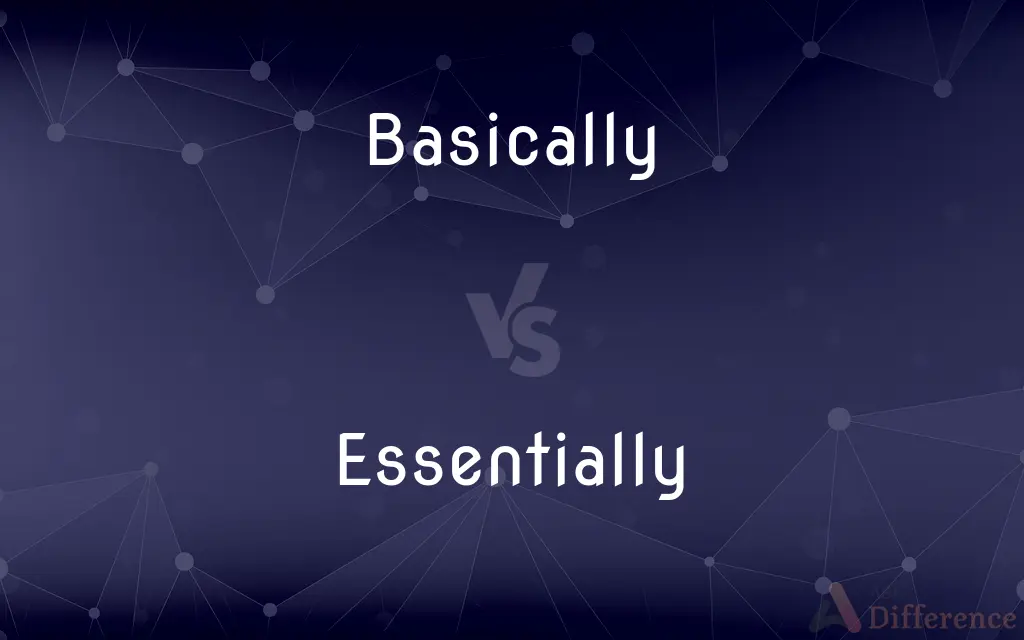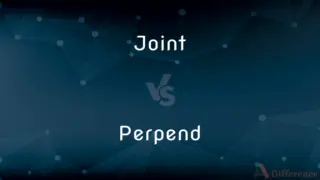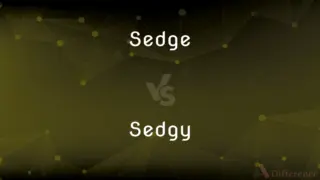Basically vs. Essentially — What's the Difference?
By Urooj Arif & Fiza Rafique — Updated on April 4, 2024
Basically and essentially both imply a fundamental level, but basically refers to the simplest or most important aspects of something, whereas essentially suggests something is inherent or indispensable.

Difference Between Basically and Essentially
Table of Contents
ADVERTISEMENT
Key Differences
Basically is used to indicate the most simple or fundamental aspects of an issue, idea, or situation without delving into more complex details. It simplifies the subject to its core. Whereas, essentially points to the inherent or crucial qualities that define something’s existence or character, suggesting that, despite possible variations, the essence remains constant.
When someone uses "basically" in a conversation, they aim to strip down the topic to its bare minimum, making it easier to understand or convey. On the other hand, using "essentially" implies that, even if all non-essential parts were stripped away, the essence of the matter would still be the same.
Basically often serves to introduce a summary or a simplified explanation that might omit nuances for the sake of clarity. Whereas, essentially might precede a statement that underscores the underlying or unchangeable aspects of a subject, acknowledging that while details may vary, the core remains stable.
In everyday speech, "basically" is commonly used to preface a simplified version of a story or explanation, indicating that the speaker is omitting finer details. Conversely, "essentially" is used when the speaker wants to highlight that, despite any differences in detail, the fundamental nature or outcome does not change.
While "basically" can sometimes be used interchangeably with "essentially," the choice between them can subtly alter the meaning conveyed. Essentially might imply a deeper, more intrinsic link to the subject's nature than basically, which leans towards a more surface-level simplification.
ADVERTISEMENT
Comparison Chart
Definition
Refers to the simplest or most fundamental aspects.
Indicates something inherent or indispensable to the subject's nature.
Usage Context
To simplify or strip down to basic elements.
To highlight inherent qualities or crucial aspects.
Connotation
Simplification for clarity, omitting complexities.
Core essence, beyond surface details.
Speech Function
Often precedes summaries or simplified explanations.
Used to emphasize the unchangeable nature of something.
Interchangeability
Sometimes used interchangeably, but with a focus on simplification.
Used where the inherent nature or indispensable qualities are highlighted.
Compare with Definitions
Basically
Simplifying to the most fundamental aspects.
Basically, it's a matter of right and wrong.
Essentially
Highlighting indispensable qualities.
Water is essentially vital for life.
Basically
Used to introduce a simplified explanation.
He's basically saying we need more time.
Essentially
Emphasizing the unchangeable aspect.
Essentially, this means we're starting over.
Basically
Indicating the base or simplest form.
She's basically a freelancer.
Essentially
Underscoring the core essence.
He's essentially a good person, despite his flaws.
Basically
Prefacing a generalization.
Basically, everyone agreed with the decision.
Essentially
Referring to the inherent nature of something.
Essentially, it's the same concept with minor tweaks.
Basically
Signaling a return to the main point.
Basically, we're out of options.
Essentially
Used when differentiating details from core truths.
The stories vary but are essentially the same.
Basically
In the most essential respects; fundamentally
We started from a basically simple idea
Essentially
Constituting or being part of the nature or essence of something; inherent
"In that era of general good will ... few Americans doubted the essential goodness of their society" (David Halberstam).
Basically
In a basic way; fundamentally or essentially
Throughout the ordeal, he remained basically the same.
Essentially
Fundamentally important or necessary
Essential ingredients.
Basically
For the most part; chiefly
They basically do what they are supposed to.
Essentially
(Medicine) Of, relating to, or being a condition or a disease whose cause is unknown
Essential hypertension.
Basically
In a fundamental, essential or basic manner
They've added some fancy features, but it's basically still a crappy car.
Essentially
(Biochemistry) Being a substance that is required for normal functioning but cannot be synthesized by the body and therefore must be included in the diet
Essential amino acids.
Basically
Mostly; generally; for the most part
Essentially
Something fundamental.
Basically
(filler) used to refer to the most important or fundamental point the speaker is making; sometimes tending towards a meaningless filler word
I shouldn't have done it, basically.
To get your eyes tested, you should basically go to the opticians.
Essentially
Something necessary or indispensable.
Basically
At bottom or by one's (or its) very nature;
He is basically dishonest
The argument was essentially a technical one
For all his bluster he is in essence a shy person
Essentially
In essence
Essentially
In an essential manner or degree; in an indispensable degree; really; as, essentially different.
Essentially
At bottom or by one's (or its) very nature;
He is basically dishonest
The argument was essentially a technical one
For all his bluster he is in essence a shy person
Common Curiosities
Can I use essentially to emphasize the fundamental aspect of an argument?
Absolutely, essentially is perfect for highlighting the core essence of an argument.
When should I prefer using basically over essentially?
Use basically when aiming to simplify or when providing a summary.
Is basically used to make explanations easier to understand?
Yes, basically is often used to provide a simplified version of a more complex explanation.
Can the use of basically indicate that details are being omitted for clarity?
Yes, it suggests that the explanation is simplified by leaving out less relevant details.
Does essentially suggest that something is unchangeable?
Yes, it implies that the essence or core nature remains constant despite changes.
Does using essentially imply a deeper understanding of the topic?
It can suggest a focus on the core or essential aspects, indicating a deeper insight.
Can basically and essentially be used interchangeably?
Yes, in many contexts, but the subtle difference in meaning should be considered.
Is basically more about simplification than essentially?
Yes, basically is more about simplifying or reducing to basic elements.
Does essentially imply something is crucial or inherent?
Yes, essentially refers to something's inherent or indispensable nature.
Can basically signal a transition back to the main point in a conversation?
Yes, it's often used to steer a conversation back to the central topic.
Is essentially a good choice to underscore the intrinsic qualities of something?
Yes, it's used to emphasize inherent qualities or the essence of something.
When is essentially the better choice in language?
When you want to highlight the fundamental, unchangeable nature of something.
Can basically be used to preface a general statement?
Yes, it's commonly used to introduce a broad or simplified statement.
Is essentially used to express that the basic nature of something doesn’t change?
Yes, it's used to convey that the essence remains the same despite variations.
Does essentially convey a sense of indispensability?
Yes, it underscores something as fundamental or crucial to the subject's nature.
Share Your Discovery

Previous Comparison
Joint vs. Perpend
Next Comparison
Sedge vs. SedgyAuthor Spotlight
Written by
Urooj ArifUrooj is a skilled content writer at Ask Difference, known for her exceptional ability to simplify complex topics into engaging and informative content. With a passion for research and a flair for clear, concise writing, she consistently delivers articles that resonate with our diverse audience.
Co-written by
Fiza RafiqueFiza Rafique is a skilled content writer at AskDifference.com, where she meticulously refines and enhances written pieces. Drawing from her vast editorial expertise, Fiza ensures clarity, accuracy, and precision in every article. Passionate about language, she continually seeks to elevate the quality of content for readers worldwide.















































